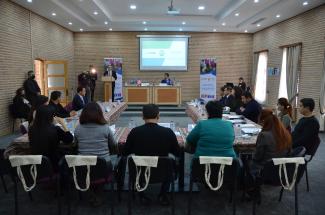Yesterday morning, U.S. Ambassador Litzenberger launched a Training for First Responders on Identification of Victims of Trafficking hosted by the International Organization for Migration (IOM) and funded by the United States Agency for International Development (USAID). The three-day training, which is part of USAID’s “Countering Trafficking in Persons Activity,” provides attendees with additional skills and knowledge concerning the detection, identification, and referral of victims of trafficking, forced labor, and exploitation.
Participants in the training are 10 individuals on the front line of anti-trafficking efforts, including five police officers, and five representatives of various state bodies and local civil society whose roles put them in a position to interact with or detect potential victims of trafficking. Representatives from the Ganja Rayon Executive Committee also attended the event. Training participants have been selected from:
- The Police Divisions of Ganja, Shamkir, and Tovuz districts,
- The Regional Committee for Family, Women and Children Affairs,
- The Ministry of Labor and Social Protection, and
- Relevant non-governmental organizations (NGOs) offering assistance services to victims and potential victims in the region.
Speaking at the opening of the training, Ambassador Litzenberger noted how serious of a problem human trafficking has become worldwide, exceeding 25 million victims at any given time. The Ambassador appreciated the efforts of the Azerbaijani government and local NGOs in this area and stressed the importance of cooperation between states and institutions in this fight. He also praised the tireless work of IOM, and its local Chief of Mission, Vladimir Gjorgiev, in the fight against human trafficking. Finally, the Ambassador personally congratulated and thanked each attendee for their commitment to ending the international scourge of trafficking in persons.
In his following remarks, Mr. Gjorgiev noted that Azerbaijan is seriously fighting against human trafficking and that IOM aims to increase the country's ranking in the Anti-Human Trafficking Report by assisting the efforts of the government and NGOs. Mr. Gjorgiev stressed the importance of taking steps to first prevent vulnerable people from becoming victims of human trafficking, and after identifying potential victims, to provide effective help and support. According to Mr. Gjorgiev, "The best practices and methodologies taught here will contribute to addressing the serious problems posed by human trafficking," said Gjorgjiev.
During the training, participants are broadening their knowledge on Trafficking and Anti-Trafficking Basic Concepts, Consequences of Trafficking on Health of Victims, Ethics in Communication/Interviewing presumed victims, Standard Activity Procedures in the Republic of Azerbaijan, National Referral Mechanism Models, and the Azerbaijan National Action Plan Against Trafficking in Human Beings.
USAID’s Countering Trafficking in Persons Activity, implemented by IOM, assists the Government of Azerbaijan and NGOs to further improve Azerbaijan's effectiveness in preventing and combating trafficking in persons and forced labor as well as addressing gender-based violence. This includes technical and financial support to civil society organizations operating shelters that assist potential and actual victims of trafficking and forced labor.

Maykl Miller/USAID
